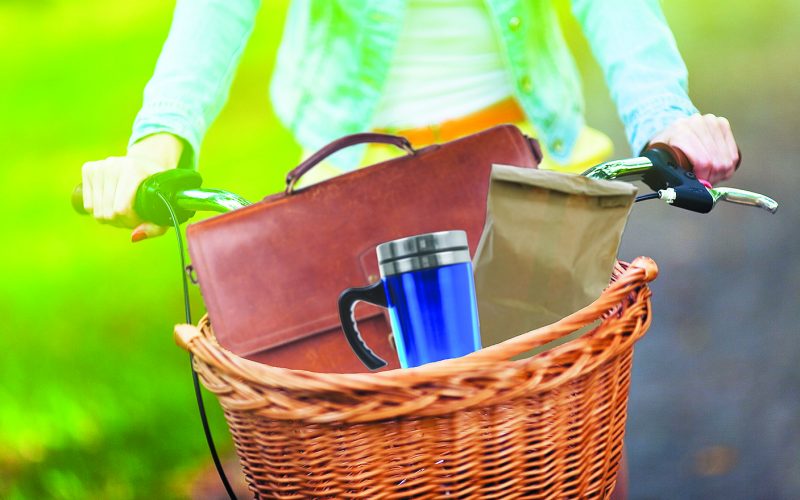By Terrah Baker
Riding your bicycle on a sunny Saturday on Fayetteville’s multi-use trail system is one thing; making the commitment to a healthier lifestyle through using a bicycle as transportation is another, said Bicycle Coalition of the Ozarks’ co-founder Laura Kelly. But what keeps most people from gaining the benefits of bicycle commuting is the perceived fear that also comes with it.
Perceived Danger
“People hear that big noisy motor and it’s scary. But, when you drive on that road, what do you do when you see a cyclist in front of you? You don’t run over them. Operate just like you’re operating a car,” Kelly said. “When cycling in an urban environment while obeying the rules, getting hit just doesn’t happen.”
While bicycle-car accidents do occur — in most cases in intersections or due to cyclists disobeying traffic laws — the US. Department of Transportation’s National Highway Traffic Safety Administration reported in 2010 that only 2 percent of traffic fatalities included bicyclists, which was down 2 percent from 2009.
Kelly and BCO member Dan Dean said that could be because cyclists are becoming more educated on proper bicycling etiquette, while cars are becoming more aware of bicyclists’ presence.
“It’s about always being visible and predictable. Have a bright color or light and reflector at night so the cars overtaking you can avoid you,” he explained. “We want to be able to communicate with other drivers our intentions at all times.”

Photo Submitted
Fayetteville students take part in the Bike Train that leads children to and from school on bicycles.
Fear isn’t the only hold-up, though, said Dean. Rain and cold weather are realities in NWA, and time is of the essence in our busy area. However, being prepared and planning ahead comes naturally after just a few weeks, said Dean and commuters in last year’s commuter competition.
Bike To A Happy Life
BCO has again this year planned advocacy and educational events, along with a weeklong competition challenging residents to let go of their fear and ride their bike to work during May — National Bicycling Month. Last year was the first year the initiative took off, Laura said, and hundreds of NWA residents took to the roads, with no fatalities or serious injuries.
Those who did said what studies show — it made them feel more awake, productive and greatly improved their overall health.
“I want people to have a good life. For me, I was also able to pay off a house because I didn’t have a car payment,” Kelly said. “And you just feel better all day.”
Studies have shown that bicycle commuters are more productive at work and in every-day life. Even more convincing, the American Heart Association reviewed and supported a study that showed these same bicycling commuters were 30 times less likely to die of cancer and heart disease.
“Going to the gym after work just doesn’t work for most families, so why not make exercising part of your daily commute?” Kelly asked.
And that’s what they’ll ask NWA residents to do during the week of May 12-18 during the Bicycle Commuter Challenge. Sign up and find all of the details on their website, bconwa.com.

Photo By Terrah Baker
Dan Dean of BCO shows a little girl how to properly wear her free helmet, handed out among many others by BCO on First Thursday in April.
On May 10, members of BCO and the community will do a Bike to Work Week Proclamation and Ride to help show that bicycling is fun, safe and a feasible, practical means of transportation.
BCO Advocacy
BCO doesn’t just celebrate during May. They’ve been active in the community since 1999 with many successful educational and advocacy projects, including a large grant that bought 40 specialized hot rod bikes, 3,000 helmets, training videos and two trailers for hauling the bikes they take to schools around the area to teach children bicycle riding and safety.
They were also an important part of advocating for the Fayetteville trail system before it was developed, and even worked with the Arkansas State Police to once again include information about sharing the road with bicyclists in the driver’s education handbook.
They often distribute helmets to children at First Thursdays on the square, have advocated — although unsuccessful — to widen Highway 265 by Mission and Hunstville Road, and hold a position on the Fayetteville’s Active Transportation Advisory Committee. They try and focus their efforts on the five ‘E’s’ that make up bicycle advocacy around the country: Education, enforcement (making sure bicyclists, motorists and law enforcement follow laws pertaining to bicyclists), engineering (developing proper roads and trail systems to accommodate bicyclists), encouragement (what the commuter challenge is all about) and evaluation.
They’ve advocated for Fayetteville as a bike-friendly town through the League of American Bicyclists, earning the town a bronze classification. And for the month of May, they hope to spread the excitement for a community of healthy, happy, bicycling residents.











